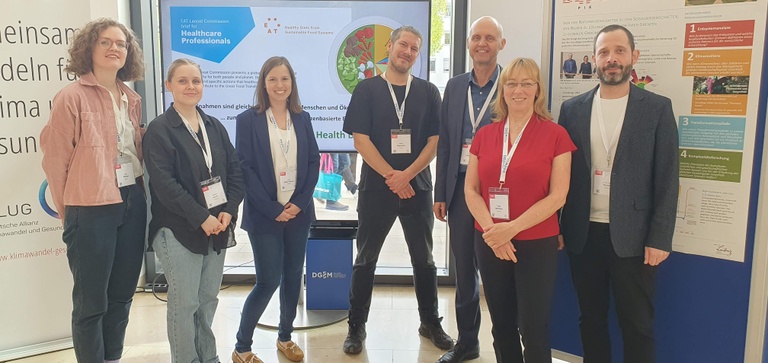
The effects of climate change on health can be manifold - from the spread of previously (sub-)tropical infectious diseases to physical stress caused by extreme weather conditions such as heatwaves. At the same time, drivers of climate change are also often drivers of ill health, such as unhealthy diets or fossil fuel emissions. Consequently, climate mitigation via shifting to more plant-based diets, switching to renewable energy sources or more active forms of transport, lead to significant health co-benefits and have the potential to lower the burden of disease.
In his presentation, Prof. Dr. Hermann Lotze-Campen, agricultural economist and head of the "Climate Resilience" research department at the Potsdam Institute for Climate Impact Research (PIK), explored the question: "How can we make the transition to a healthy, climate-friendly, fair diet?" He states that a heavily plant-based diet would result in a reduction in greenhouse gas emissions, particularly methane from livestock farming for meat and milk production, referring also to the EAT-Lancet Planetary Health Diet as a guideline for a healthy and environmentally friendly diet. A global nutritional shift towards such a healthier, more sustainable diet could be a decisive lever to limit global warming to 1.5 degrees Celsius, said Lotze-Campen.
Moreover, what people eat not only has an impact on their personal health, but also on subsequent health costs and various environmental aspects, such as nitrate pollution in groundwater and ammonia pollution in the air. Health and environmental costs of the global agricultural and food system currently amount to over ten trillion US dollars (1 trillion = 1,000 billion) per year. According to the FSEC (Food System Economics Commission) Global Policy Report, a comprehensive transformation of agricultural and food systems around the world would lead to socio-economic gains of five to ten trillion US dollars per year. This means that agricultural and food systems have a unique potential to tackle global climate, environmental and health problems simultaneously - and thus enable hundreds of millions of people to lead a better life.
In her presentation, Dr. Lisa Pörtner highlighted the importance of dietary habits for individual and planetary health. She emphasized that current dietary patterns are not only an important driver of chronic disease burden and premature mortality, they also pose a major threat to Planetary Health. The Planetary Health concept encompasses the human health impacts of environmental change, e.g. via heatwaves in the wake of climatic change, a rising mental health burden or an increased risk of infectious diseases and pandemics. She stated that due to its relevance for human health and well-being, food service in healthcare institutions should be designed to optimize all aspects of health, from the individual to the planetary scale. Contrary to this goal, results from the NURISHD study show that current diets in German hospitals and nursing homes are not only suboptimal when it comes to individual health aspects, but are also environmentally unsustainable due to the high proportion of animal-source foods.Transforming food service in these settings towards more plant-based diets therefore has significant potential to improve the health of staff, patients and residents, as well as lower the environmental footprint of the institutions.
The PIK DGIM-team also continuously presented recent results from their research at a stand with posters and flyers.






